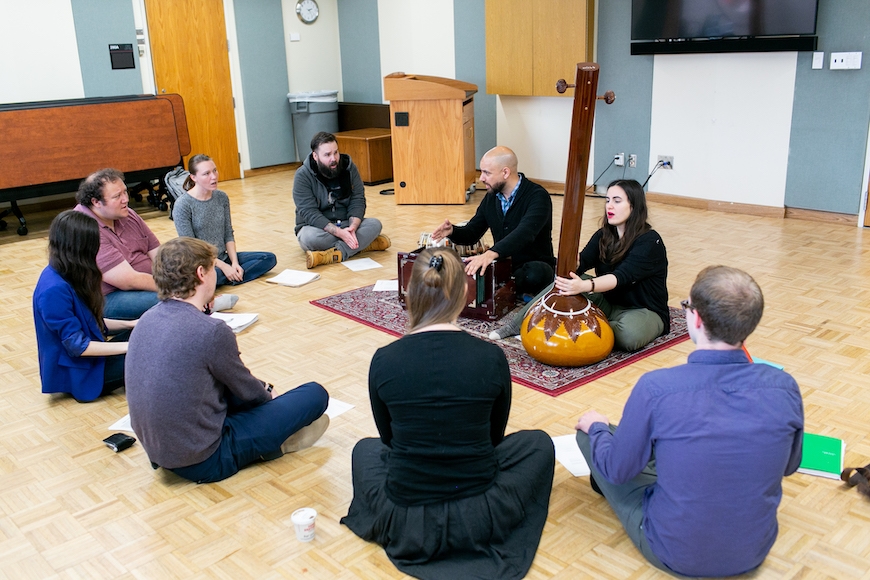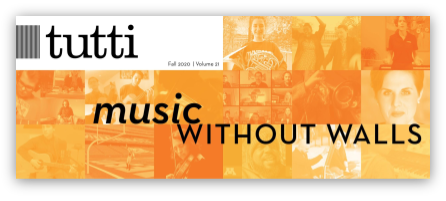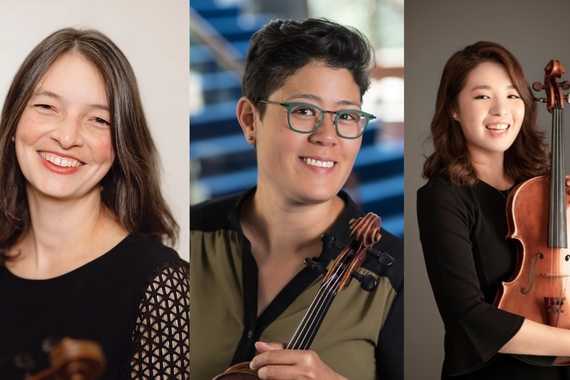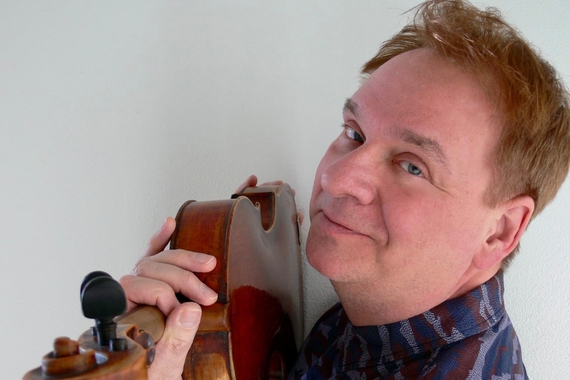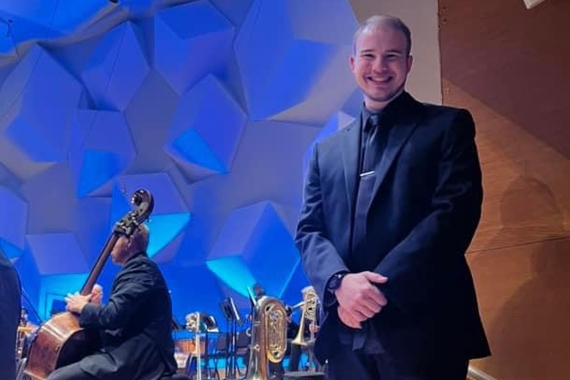A World Music Minor Creates a Welcoming Atmosphere for All
Passionate about music from all cultures? There’s a new minor for that!
In March, the Board of Regents approved a minor in world music, which builds on classes Associate Professors Matt Rahaim, Scott Currie, and their colleagues at the School of Music have already been teaching, such as African Music Ensemble, and World Music. Championed by Associate Professors Matt Rahaim and Laura Sindberg (at the end of her term as Director of Undergraduate Studies in 2019), the program gained unanimous support from the faculty on the School of Music Undergraduate Studies Committee and full faculty, and approval from the College of Liberal Arts Assembly and Board of Regents.
“The world music minor offers students [with no formal training in Western Classical music] a path into music, allowing them to deepen and expand their musical life even if they can't read staff notation or haven't learned classical repertoire,” says Rahaim, an associate professor of ethnomusicology. Below, he explains what the minor consists of and provides for students, as well as giving a brief background on his own musical path.
What is the main goal of the world music minor?
The purpose of the minor is to offer a route into the depth of music for a community of passionate, creative, intellectually curious music students. We have amazing resources at the School of Music, and a wide range of faculty who are master performers of a wide range of music. The minor gives students access to all of this musical wisdom right away, without auditions or extensive prerequisites.
What is different about the world music minor from other majors and minors in music?
In my non-major lecture classes, I have met hundreds of undergraduates who are deeply into music, many of whom are in bands, or perform traditional music, or who write and record songs on their own, but who have no formal training in Western Classical music. The world music minor offers these students a path into music, allowing them to deepen and expand their musical life even if they can't read staff notation or haven't learned classical repertoire.
I have found that these students have an incredibly deep reservoir of musical resources, even if they haven't yet learned how to identify the dots and lines on a page. The world music minor aims to harness and focus what they already have, while expanding their horizons, allowing them to discover musical worlds far beyond what is familiar to them.
What does the coursework for the minor look like?
Everybody takes a core survey of the world's musical practices, and everybody plays in several different ensembles, but each student finds their own path. It's an exceptionally flexible minor. Those who want to learn to read, write, and analyze music on paper can do so; those who want to develop new performance skills can do so; those who want to delve into musical theory and metaphysics can do so as well.
What experiences have you had with music that pushed you to create this minor?
I did my undergraduate degree at Wesleyan University, which has one of the oldest world music programs in the world, where students take Indian music history and West African drumming alongside experimental composition and Renaissance music theory. I found this setting to be incredibly inspiring. Students were encouraged to follow their passions and go deeply into performance alongside their intellectual study.
The study of world music gives you a certain comfort with disorientation; it prepares you well for the unpredictable aesthetic and ethical disjunctures that you encounter in travel and collaboration. Most of my classmates from the world music program went on to have wildly diverse and successful careers; some are composers, some are performers, some are music therapists, and some are doctors and diplomats.
What life experiences have led you to where you are now?
I came to Minnesota from California to follow my passion: teaching music. My PhD in ethnomusicology [the study of the music of different cultures] is from the University of California at Berkeley, where I focused on the history and performance of Indian music. I go to Delhi for training in Hindustani music with my guru every year. I've also composed, written, and recorded with bands my whole life.
What is the value of a liberal arts education?
The liberal arts has been by far the most valuable part of my own education, but not only because I have become a scholar. The liberal arts is not just a particular set of subjects or disciplines—it teaches an open, receptive, creative attitude toward uncertainty and complexity. It teaches you how to improvise intellectually, how to collaborate with people who are different from you, and disciplines your imagination of what's possible.
Many of our most meaningful everyday activities—dating, coaching, web design, raising children, negotiating a salary raise, organizing a political movement, navigating the weird virtual publics of social media—depend on the abilities nurtured by the liberal arts. To give a few examples: clear communication, empathy, logical acuity, ethical clarity, curiosity about confusing data, a sense of irony, theoretical flexibility, self-criticism, rhetorical power, patience, and aesthetic sensitivity. The world music minor fits naturally into a liberal arts education, and I'm proud that it will be housed in CLA.
What’s next on the horizon for you?
I just finished a book manuscript about vocal striving in North India. I have been involved with the thriving experimental music scene in the Twin Cities for a few years, and I have started working to bring raga music into electroacoustic settings. I also have been hosting a set of Hindustani music concerts at Moon Palace Books.
This story was written by an undergraduate student in Backpack. Meet the team.
Tutti. (Italian) all. every musician to take part.
Tutti is the annual publication of the University of Minnesota School of Music.
